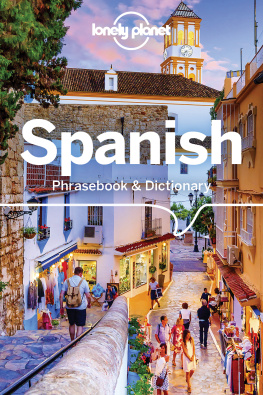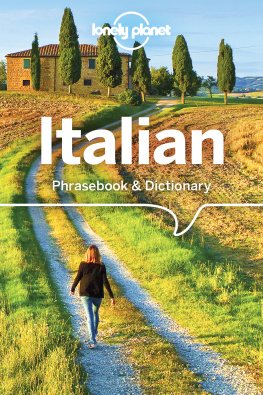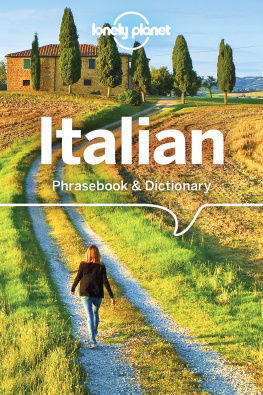Contents
Guide
INTRODUCTIONintroduccin Spanish, or Castilian, as its also called in Spain, is the most widely spoken of the Romance languages, the group of languages derived from Latin which includes French, Italian and Portuguese. Outside Spain, its the language of most of Latin America and the West Indies and is also spoken in the Philippines and Guam, as well as in some areas of the African coast and in the US. Worldwide, there are more than 30 countries or territories where Spanish is spoken. Spanish is derived from Vulgar Latin, which Roman soldiers and merchants brought to the Iberian Peninsula during the period of the Roman conquest (3rd to 1st century BC). By 19 BC Spain had become totally Romanised and Latin became the language of the peninsula in the four centuries that followed. Todays Castilian is spoken in the north, centre and south of Spain.
People are intensely proud of their language and generally expect visitors to know at least a little. English is less widely spoken in Spain than in many other European countries, especially out-side the major cities. This book gives you the practical words and phrases you need to get by, and the fun, spontaneous phrases that lead to a better experience of Spain and its people. Need more encouragement? at a glance ... language name: Spanish name in language: Espaol espanyollanguage family: Romance key country: Spain approximate number of speakers: over 390 million worldwide close relatives: Latin American Spanish, Portuguese, Italian donations to english: alligator, bonanza (lit: fair weather), canyon, guerilla, rodeo, ranch, stampede, tornado and many more familiar words ... Remember, the contact you make through using Spanish will make your travels unique.
Local knowledge, new relationships and a sense of satisfaction are on the tip of your tongue, so dont just stand there, say something! > basque, catalan & galician We also give you the basics of these languages because they are each considered official in Spain, even though Spanish, or Castilian, covers by far the largest territory. Basque, a non-latin language, is spoken in parts of the north. Catalan is spoken in the east and Galician in the north-west. These last two are also Romance languages, so are closer in origin to Spanish. If youre travelling widely in Spain, see the special section on these regional languages for some . > abbreviations used in this book
| f | feminine |
| inf | informal |
| m | masculine |
| sg | singular |
| pl | plural |
| pol | polite |
TOOLS > pronunciationherramientas de pronunciacin Spanish pronunciation isnt hard, as many sounds are similar to sounds used in English.
There are some easy rules to follow and once you learn them its likely youll be understood. The relationship between Spanish sounds and their spelling is straightforward and consistent. Like most languages, pronunciation can vary according to region. This book focuses on Castilian Spanish. nfasis There is stress in Spanish, which means you emphasise one syllable over another. Rule of thumb: when a written word ends in n, s or a vowel, the stress falls on the second-last syllable.
Otherwise, the final syllable is stressed. If you see an accent mark over a syllable, it cancels out these rules and you just stress that syllable instead. vocales
| symbol | english equivalent | spanish example |
| a | alms | agua |
| e | red | nmero |
| ee | bee | da |
| o | go | ojo |
| oo | book | gusto |
| ai | aisle | bailar |
| ow | cow | autobs |
| oy | boy | hoy |
consonantes
| symbol | english equivalent | spanish example |
| b | big | barco |
| ch | chilli | chica |
| d | din | dinero |
| f | fun | fiesta |
| g | go | gato |
| k | kick | cabeza/queso |
| kh | loch | jardn/gente |
| l | loud | lago |
| ly | million | llamada |
| m | man | maana |
| n | no | nuevo |
| ny | canyon | seora |
| p | pig | padre |
| r | run, but stronger and rolled | ritmo/burro |
| s | so | semana |
| t | tin | tienda |
| th | thin | Barcelona/manzana |
| v | soft b, somewhere between v and b | abrir |
| w | win | guardia |
| y | yes | viaje |
There are some key things to remember about consonants in Spanish writing: the letter
c is pronounced with a lisp, barthe
lona (Barcelona), except when it comes before
a,
o and
u or a consonant, when its hard like
k in king. when ending a word, the letter
d is also soft, like a th , or its so slight it doesnt get pronounced at all. the Spanish letter
j stands for a harsh and gutteral sound, so we use a kh symbol in our phonetic guides. the letter
q is pronounced hard like a k . the letter
v sounds more like a b , said with the lips pressed together. there are a few letters which dont appear in the English alphabet:
ch,
ll and . there are a few letters which dont appear in the English alphabet:
ch












